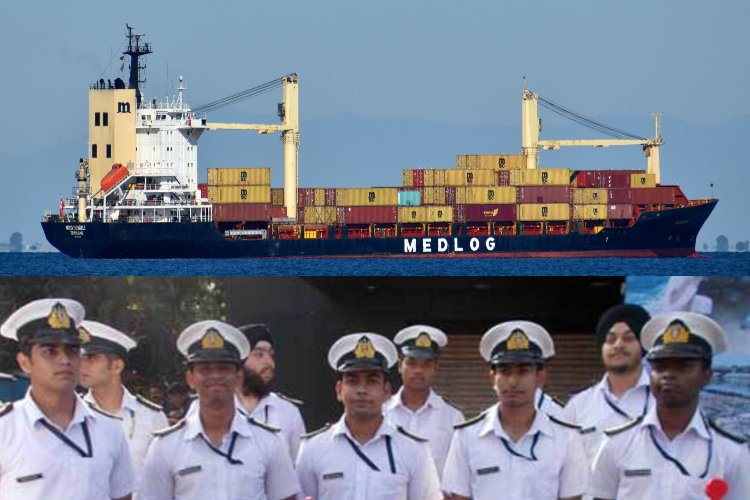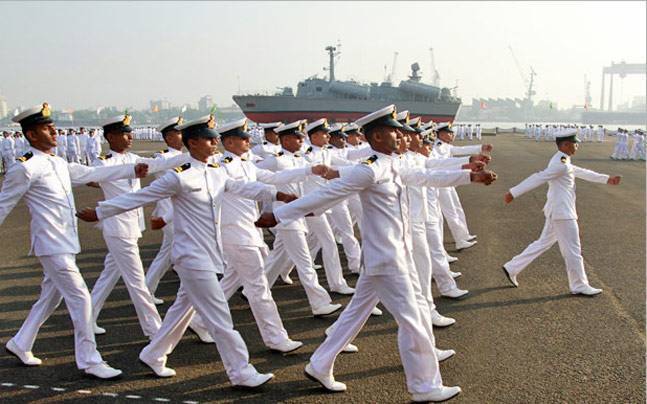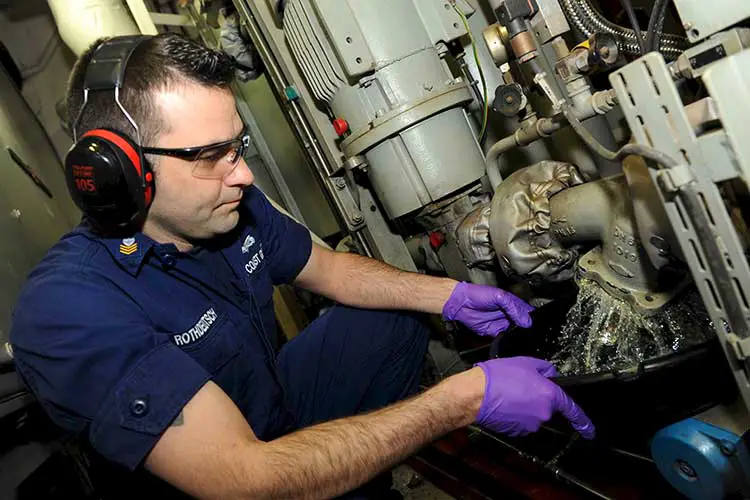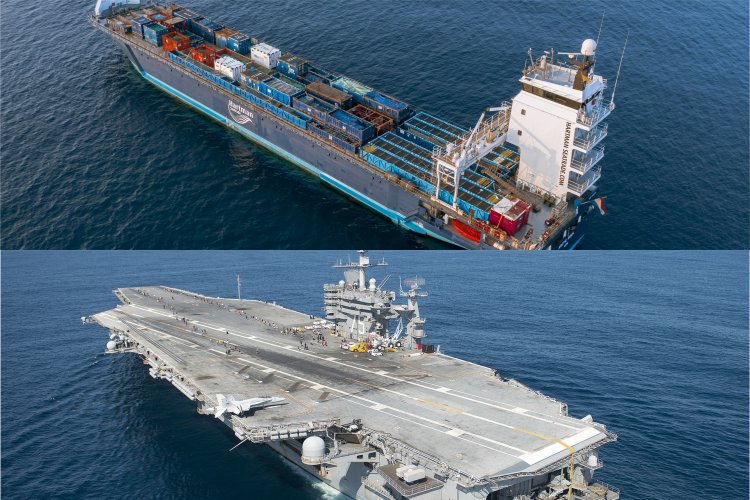How To Join Merchant Navy In India After Class 12th

Do you want to know how to join the merchant navy in India? Then, you’re at the right spot. This article will provide you all the courses, jobs, qualifications, and eligibility criteria for having a career in the merchant navy after 1oth and 12th.
There are many courses offered for a lucrative merchant navy job according to your eligibility after clearing 10th / 12th classes.
Everyone wants to be in a good college to have a secure future. Many students start worrying about their future when they are 10th. Getting into a good college after class 12th is their major aim. For that, they attend many coaching classes for engineering and medical degrees.
In India, many students appear for IIT and NDA entrance examinations. Many give CLAT (Common Law Entrance Test). A lot of these students end up in a private college because of high competition. Therefore it is very necessary to choose your career wisely.
Joining Merchant Navy is also a good career option. A career in Merchant Navy can be most advantageous if you are looking for good pay.
Businesses across the World depend on the shipping industry directly or indirectly. This industry requires trained and qualified personnel to function smoothly.
Maritime courses train students to take on various roles in the shipping industry. There are many more advantages of joining the merchant navy such as tax benefits, better lifestyle, long vacations, etc. You get a high salary. The government provides certain tax relaxation to merchant navy employees if they meet the criteria.
You will get to travel to various countries around the globe. Although you have to remain in the sea for 6 months away from family, that also means a long vacation after their stint. Life in the Merchant Navy is always full of adventures and challenges.
Merchant navy is the fleet of trading vessels that are registered in a specific country. The merchant navy is responsible for transporting heavy goods from one country to another. It is the backbone of international trade as most of the import and export are done through ships.
Merchant navy consists of all non-military ships including bulk carriers, coasters, container ships, tankers, passenger lines, etc., but excluding fishing and research vessels, listed on the official registry of a country.
Indian Merchant Navy was established before independence. In 1919, the first Indian ship sailed from India to Britain. The name of the vessel was SS Loyalty.
Today, there are many well-established Merchant Navy training institutes in our country such as T.S Chanakya, Marine Engineering & Research Institute (MERI) Kolkata, MERI Mumbai, LBS Mumbai, and many more. In these, MERI is considered the best and most prestigious institute.
MERI is situated in Kolkata and has a branch in Mumbai. Training in MERI consists of theoretical classes together with practical training in the institutes. Various workshops are also held such as maintenance and repairing of ship machinery in marine workshops and repair yards.
It is compulsory for each student to take part in physical training, swimming, and various outdoor games. Strict discipline is maintained in the institution. The passing out certificate from this institution is equivalent to a degree in Marine Engineering by the Ministry of Human Resource Development (Education) and the All India Council of Technical Education.
Also read: What is MNTB?
Merchant Navy is present in both the private and the public sectors. Most of the merchant navy jobs are in private shipping firms. Shipping Corporation of India (SCI) is a PSU (Public Sector Undertaking) and is a major player in India.
There are enormous employment opportunities in this field. The one who has completed the basic course of merchant navy can easily get jobs in any shipping company. Also, the possibility of finding jobs in a cargo ship is more as compared to others.
The deck cadet is responsible for ship management and maintenance. The deck department jobs involve navigating the vessel using a GPS system and radar equipment, monitoring weather and wind, listening and responding to the radio broadcasts from across all countries regarding weather.
2) Electro-Technical Officer (ETO)
They are responsible for the maintenance of all electrical equipment onboard the ship.
3) Engineer
To maintain the mechanical propulsion system of the marine vessel, including the engines, pumps, boilers, and generators.
4) Ratings
Ratings are skilled seafarers who help all the officers with daily tasks
5) Catering & Hospitality Crew (pursers, stewards, chef, housekeeper, etc.)
Also read: Top Websites For Merchant Navy Jobs
You can join Merchant Navy after 10th class also, but in that case, you are not going to get an officer’s rank on the ship. That is why it is better to go for the Merchant Navy after the 12th standard.
After class 12, you can study the following merchant navy courses:
- B.Tech Marine Engineering
- B.Tech Harbour & Ocean Engineering
- B.Tech Naval Architecture and Offshore Engineering
- B.Tech Ship Building
- B.E. Mechanical Engineering
- B.E Harbour and Ocean Engineering
- B.E Marine Engineering
- Electro-Technical Officer Course
- Marine Engineering under Alternate Training Scheme
- BSc. Nautical Science
- M.B.A. Shipping & Logistics Management
- MBA Shipping Finance
- B.B.A. Logistics & Supply Chain Management
- B.Sc Nautical Science
- G.P. Rating
- Diploma in Marine Engineering (DME)
- Diploma in Nautical Science (DNS)
- Higher National Diploma (Marine Engineering)
- BBA Shipping
- Higher National Diploma (Nautical Science)
After completion of the 12th class, interested candidates can appear for the Indian Maritime University Common Entrance Test (IMU CET) or the All India Merchant Navy Entrance Exam. This exam is generally conducted in the month of May/June.
IMU CET is a National Level entrance exam conducted for the candidates of India for admissions to the maritime courses. A candidate must clear this exam before doing any undergraduate program in the merchant navy. If he fails to clear it then he won’t be eligible for any course in the merchant navy.
Candidates who are shortlisted based on CET scores will be called for Counseling at designated IMU Campuses and will involve verification of original mark sheets and certificates, physical fitness clearance, and allotment of seats in the IMU Campuses or Affiliated Institutes. Candidates can seek admissions for B.Sc, M.Sc, B.Tech, M.Tech, BBA, and MBA courses in the marine field.
B.Tech Marine Engineering
Details
Marine engineering is a comprehensive 4 years engineering course. On successful completion, the student becomes a junior engineer. After serving his stint as a Junior Engineer for 6 months on a ship, he becomes eligible to appear for the Class IV exam. To given the exam, he has to attend a 3-month course. After successfully passing the exam, the Junior Engineer gets promoted as a Fourth Engineer on a ship.
Age Limit
The candidates should be between 17 years (minimum) and 25 years (maximum).
Educational Qualifications
The candidate should have passed the 12th Science stream with Physics, Chemistry, and Mathematics subjects. The aggregate marks requirement is 60% marks.
Electro-Technical Officer Course
Details
ETO (Electro-Technical Offer) training course is required to become Electrical Officers aboard merchant navy ships. ETO is responsible for maintaining and supervising all the electrical and electronic equipment in a ship.
ETO course is a pre-sea training course. After completing the course, 6 months of sea service after gives the candidate ETO certification.
Age limit
The upper age limit is 35 years.
Educational Qualifications
The candidate should have a Diploma or Bachelor’s Degree in Electrical/Electronics/Electrical or Electronics/Electronics and Telecommunication/Communication/Electronics or Instrumentation Engineering. Candidate must also have completed 10+2 Science stream with Physics, Chemistry, Mathematics and English subjects.
B.Sc. Nautical Science
Details
It is a 3 years long Bachelor of Science Degree course. On completion, the candidate is awarded the Second Mates Foreign Going Certificate of Competency by the Ministry of Shipping, India.
Age limit
The candidates should be between 17 years (minimum) and 25 years (maximum).
Educational Qualifications
The candidate should have passed the 12th Science stream with Physics, Chemistry, and Mathematics subjects. The aggregate marks requirement is 60% marks.
Diploma in Nautical Science
Details
After the completion of the course, the candidate has to complete 18 months of sea service leading to a 2nd mate foreign going certificate from the Ministry of Shipping, along with a B.Sc. Nautical Science Degree.
Age limit
The candidates should be between 17 years (minimum) and 25 years (maximum).
Educational Qualifications
The candidate should have passed the 12th Science stream with Physics, Chemistry, and Mathematics subjects. The aggregate marks requirement is 60% marks.
Diploma in Marine Engineering (DME)
Details
It is a 2 years pre-sea training course for Diploma holders. On completion of the course, the candidate is awarded the Class 4 Marine Engineer Certificate of Competency by the Ministry of Shipping.
Age limit
The candidates should be within 28 years of age.
Educational Qualifications
This program is open for engineering diploma holders. Diploma holders in Mechanical/Electrical/Naval Architecture/Electrical and Electronics Engineering branches may apply for this course. Candidates must have scored at least 50% marks in the final year of the Diploma course.
GP Rating Course
Details
GP Rating stands for General Purpose Rating. The course duration is a 6 months course. After completion of the course, candidates may join Merchant Navy ships as Deck or Engine crew. Along with sea service, they may also rise through ranks, depending on their performance.
Age limit
The candidates should be between 17 years (minimum) and 25 years (maximum).
Educational Qualifications
Candidates must have passed 10th standard examinations from a recognized board with at least 40% marks.
Deck Rating Course
Details
Deck Rating is a specialized deck crew training course. This pre-sea training course’s duration is 6 months.
Age limit
The candidates should be between 17.5 years (minimum) and 25 years (maximum).
Educational Qualifications
Minimum qualification required- 10th standard passed (with mathematics, science, and English subjects) from a recognized board. The candidate should be fit as per Merchant navy rules. Eyesight requirement is 6/6 with no color blindness. This program focuses on deck training only. After completing the course, sea service, and gaining requisite certificates, the candidate may join a merchant navy ship as part of the deck crew.
Engine Rating Course
Details
Engine Rating is a specialized engine crew training course. This pre-sea training course’s duration is 6 months.
Age limit
The candidates should be between 17.5 years (minimum) and 25 years (maximum).
Educational Qualifications
Minimum qualification required- 10th standard passed (with mathematics, science, and English subjects) from a recognized board. The candidate should be fit as per Merchant navy rules. Eyesight requirement is 6/6 with no color blindness. This program focuses on deck training only. After completing the course, sea service, and gaining requisite certificates, the candidate may join a merchant navy ship as part of the deck crew.
Saloon Rating Course
Details
The saloon course is a specialized course for the catering department of a merchant navy ship. It trains students for the catering department aboard merchant navy ships. This pre-sea training course’s duration is 6 months.
Age limit
The candidates should be between 17.5 years (minimum) and 25 years (maximum).
Educational Qualifications
Minimum qualification required- 10th +2 standard passed from a recognized board. Some institutes may also allow 10th standard pass. The candidate should be fit as per Merchant navy rules.
English
- Parts of Speech
- Synonyms and Antonyms
- Meaning of words/phrases
- Tenses
- Phrasal verbs
- Idioms
General Aptitude
- Critical Reasoning
- Word Groups
- Instructions
- Structural Analysis
- Syllogism (Logic Syllogism (Logic-based questions)
- Fill in / Completion of series based on Pattern / Logic, Data Sufficiency
- Data Interpretation
- Pipes & Cisterns
- Odd Man Out
- Boat & Streams
- Numerical Computation
- Numerical Estimation
- Time & Work
- Calendar
- Clocks
- Stocks
- Time & Distance
- Height & Distance
- Quantitative Aptitude
- Analytical Reasoning
- Logic Reasoning
- Fault Diagnosis
- Abstract Reasoning
- Mechanical Reasoning
- Mixture & Allegation
- Ratio
- Numerical Reasoning
General Knowledge
- Basic GK Questions
- Current Affairs
Physics
- 12th standard state board and CBSE syllabus
Chemistry
- 12th standard state board and CBSE syllabus
Mathematics
- 12th standard state board and CBSE syllabus
About IMU-CET
This exam is computer-based and the duration is 3 hours. There are 6 sections: English, GK, general aptitude, chemistry, maths, and physics. Number of questions in section: English-25, GK-25, General Aptitude-25, Chemistry-25, Mathematics-50, Physics-50. In total there are 200 multi-choice questions in the question paper and no negative marking is there. You can easily find many sample papers online for preparation. Aspirants should solve the previous year’s questions/sample papers to score well in the entrance exam.
Many people think that the Merchant navy and the Indian navy are the same but they are not. There are many differences such as:
- The Indian Navy is a combatant force of the Indian government that guards the sea. Indian Navy the naval branch of the armed forces of India. It was first founded in the year 1830 which is active till the present day. The President of India serves as the Commander-in-Chief of the Navy. Their duty is to protect India’s diplomatic interests and maritime which involves protecting the welfare of our citizens in foreign lands and sending diplomatic missions to other countries. While Merchant Navy is a non-combatant commercial fleet, which deals with transporting cargo and occasionally, passengers, by sea.
- Indian Navy depends on central government allotted different subsidies, budget through the defense ministry of India while the merchant navy is independent.
- Types of ships used by the Indian Navy are Aircraft Carriers, Submarines, Destroyers, frigates, corvettes, etc. Whereas ships used in Merchant Navy are: Ferries (passenger ships used for transportation), Cruise Ships (used for pleasure voyages), Dry Bulk Carriers (for carrying bulk cargo items such as iron ore, bauxite, coal, etc.), Cargo Container Ships (they carry finished goods packaged in truck-size containers), LPG & LNG Carriers (for hydrocarbon products such as oil, LPG, LNG), Car Carriers & Ro-Ros (used for transporting cars, trucks, and vehicles.
- There are only two ways to join the navy either by NDA after 12th or Indian Naval Academy after graduation. But many institutes and academies are available for Merchant Navy.
- The logo of both the Indian Navy and Merchant Navy are different from each other. The only similar thing is the color of the uniform. They both wear white uniforms. The ranking system is also different.
Summary
The best thing is both men and women can join the Merchant Navy. Although it is a male dominant sector slowly and steadily women are making their way.
As per reports, the number of female candidates enrolling for the merchant navy courses has increased several folds as compared to the previous times. Many women are in the top positions both offshore and aboard ships.
You get to learn a lot in this job. You get a lot of facilities. You get to interact with a lot of people from all over the world. You learn a lot from the fellow crew members of the ship. You can earn a lot in this field in very little time.
Many sailors open their own shipping company after they retire. It is the best job for people who like traveling a lot. You can live a luxurious life after retirement from this job.








I want to join merchant navy
I want to join merchant navy ( catering and hospitality crew )